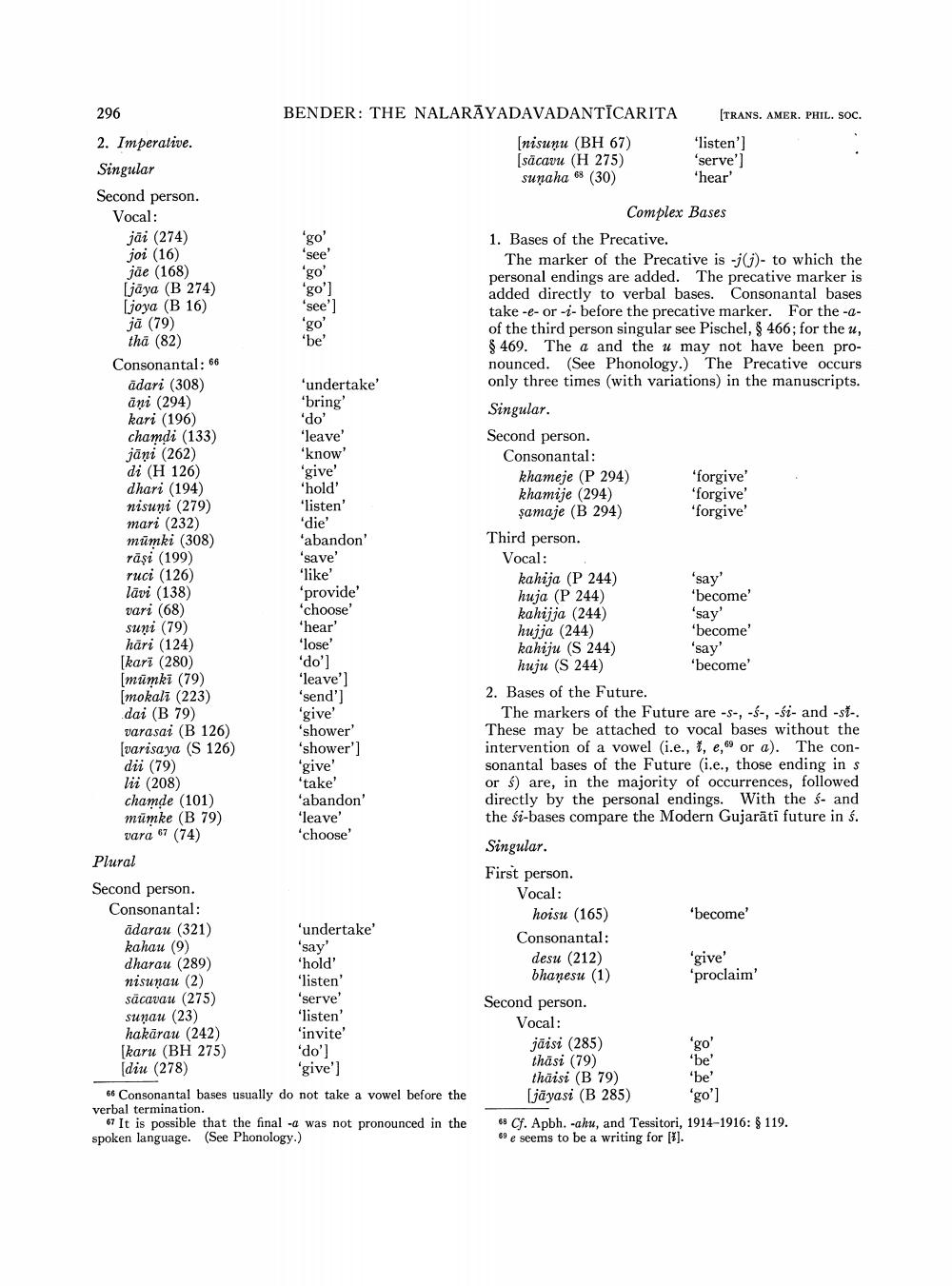________________
'go'
296
BENDER: THE NALARĀYADAVADANTĪCARITA (TRANS. AMER. PHIL. SOC. 2. Imperative.
(nisuņu (BH 67) *listen'] Singular
(säcavu (H 275)
'serve'] sunaha 6 (30)
'hear' Second person. Vocal:
Complex Bases jāi (274)
1. Bases of the Precative. joi (16) 'see'
The marker of the Precative is -16)- to which the jäe (168) 'go'
personal endings are added. The precative marker is (jāya (B 274) 'go']
added directly to verbal bases. Consonantal bases (joya (B 16) 'see']
take -- or -;- before the precative marker. For the -- jā (79) 'go'
of the third person singular see Pischel, $ 466; for the u, tha (82) "be
8 469. The a and the u may not have been proConsonantal: 66
nounced. (See Phonology.) The Precative occurs ādari (308) 'undertake'
only three times (with variations) in the manuscripts. āņi (294) 'bring'
Singular. kari (196)
'do' chamdi (133) "leave
Second person. jāņi (262) 'know'
Consonantal: di (H 126) give'
khameje (P 294) 'forgive dhari (194) 'hold'
khamije (294)
'forgive nisuņi (279) "listen'
şamaje (B 294) 'forgive' mari (232)
'die' mümki (308) 'abandon
Third person. rași (199) 'save'
Vocal: ruci (126) 'like'
kahija (P 244)
'say' lāvi (138) provide
huja (P 244)
'become vari (68) 'choose
kahijja (244)
'say' suņi (79) 'hear'
hujja (244)
'become' hari (124) 'lose
kahiju (S 244)
'say' [kari (280)
huju (S 244)
'become [mümki (79)
"leave'] [mokali (223) 'send']
2. Bases of the Future. dai (B 79) 'give
The markers of the Future are ---, --, -si- and -st-. varasai (B 126) 'shower
These may be attached to vocal bases without the (varisaya (S 126) 'shower']
intervention of a vowel (i.e., 1, e, or a). The condii (79) 'give'
sonantal bases of the Future (i.e., those ending in s lii (208) 'take
or s) are, in the majority of occurrences, followed chamde (101) 'abandon
directly by the personal endings. With the s- and mümke (B 79) *leave
the si-bases compare the Modern Gujarati future in s. vara 67 (74) 'choose
Singular. Plural
First person. Second person.
Vocal: Consonantal:
hoisu (165)
become' ādarau (321) 'undertake
Consonantal: kahau (9)
'say' dharau (289) 'hold'
desu (212)
'give' nisunau (2) 'listen
bhanesu (1)
'proclaim sācavau (275) 'serve
Second person. suņau (23) listen
Vocal: hakārau (242)
'invite [karu (BH 275) 'do']
jāisi (285) (diu (278)
thasi (79)
'be' give']
thāisi (B 79)
'be' 6 Consonantal bases usually do not take a vowel before the [jāyasi (B 285) 'go'] verbal termination.
67 It is possible that the final -c was not pronounced in the 68 Cf. Apbh. -ahu, and Tessitori, 1914-1916: $ 119. spoken language. (See Phonology.)
69 e seems to be a writing for [\].
do']
'go'




